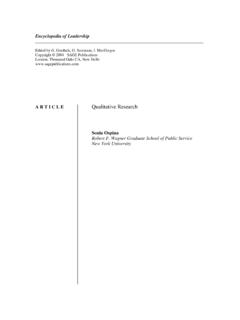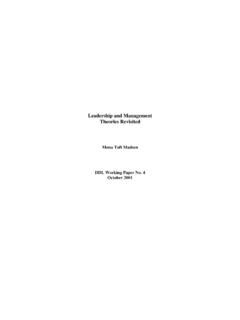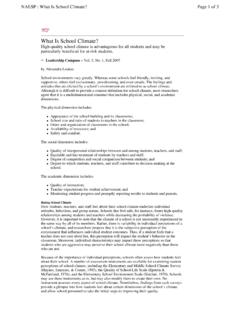Transcription of GLOBE: Global Leadership and Organizational Behavior ...
1 GLOBE: Global Leadership and OrganizationalBehavior EffectivenessResearch ProjectPROGRESS REPORTP rincipal Investigator:Robert J. HouseDepartment of ManagementWharton School of BusinessUniversity of PennsylvaniaFels Building, Suite 233814 Walnut StreetPhiladelphia, PA 19104-6197(215) 898-2278(215) 573-5613 purpose of this report is to provide information concerning GLOBE related activities by members of the GLOBE community as of March 1, : About GLOBEThe Global Leadership and Organizational Behavior Effectiveness(GLOBE) Research Project is a multi-phase, multi-method program of crosscultural research in which investigators spanning the world are examining theinter-relationships between societal culture, Organizational culture, andorganizational Leadership . Approximately one hundred and seventy socialscientists and management scholars from 61 countries representing all majorgeographic regions throughout the world are engaged in this long-termprogrammatic series of cross-cultural and Brief History of the GLOBE ProjectThe idea of a Global research program concerned with Leadership and organizationpractices (form and processes ) was conceived by Robert J.
2 House (The WhartonSchool, The University of Pennsylvania) in the summer of 1991. A grant proposalwas written in the spring of 1993, following a substantial literature review anddevelopment of an item pool containing 753 questionnaire items. GLOBE began inOctober of 1993. GLOBE was funded in October of 1993 by a $625,000 grantfrom the US Department of Education and in 1998 by a $100,000 grant from USthe National Science Investigator:Robert J. House (The Wharton School, University of Pennsylvania, USA)Co-Principal Investigators:Marcus W. Dickson (Wayne State University, USA)Paul J. Hanges (University of Maryland, USA)S. Antonio Ruiz-Quintanilla3 GLOBE Coordinating Team (GCT):The activities of the project as a whole are coordinated by the GLOBEC oordinating Team (GCT). The Principal Investigator and the Co-PrincipalInvestigators are members of the GCT along with:Ram Aditya (Louisiana Tech University)Staffan Akerblom (School of Economics, Stockholm, Sweden)Felix Brodbeck (University of Munich, Germany)Jagdeep Chhokar (Indian Institute of Management, Ahmedabad, India)Peter W.
3 Dorfman (New Mexico State University, USA)Mansour Javidan (University of Calgary, Canada)Enrique Ogliastri (University of Los Andes, Colombia)Marius van Wyk (University of South Africa, South Africa)Country Co-Investigators (CCIs):The GLOBE community consists of a network of approximately 170 socialscientists and management scholars from 61 countries/cultures from around theworld. These Country Co-Investigators (CCIs) are responsible for Leadership ofthe project in a specific country or countries in which they have expertise. Mostcountries have between two and five CCIs working on the project as a researchteam. The first GLOBE monograph is on the GLOBE web page. A listing of theCCIs can also be obtained from the GLOBE web site. Instructions to access theGLOBE web site are provided on page Monographs and non-journalPublicationsHouse, R. J., Hanges, P. J., Ruiz-Quintanilla, S. A., Dorfman, P. W., Javidan, M.,Dickson, M. W. and all contributors to GLOBE Phase II data (to be listed by nameand affiliation).
4 (in press, 1999) Cultural influences on Leadership andorganizations: Project GLOBE. In Mobley, W. F. (ed.), Advances in GlobalLeadership, , JAI , E., McMillen, C., Altschul, C., Arias, , Bastamente, C., Davila, C.,Dorfman, P., Ferreira, M., Finmen, C. and Martinez, S. (in press, 1999) "Culturay liderazgo organizacional en America Latina. El estudio Globe (Culture andorganizational Leadership in Latin America: the GLOBE Study), Chapter to bepublished in Revista Latinoamericana de Administraci , M. W., Aditya, R. N. and Chhokar, J. S. (in press). Definition andinterpretation of cross-cultural Organizational culture research: Some pointersfrom the GLOBE research program. In Ashkanasy, N., Wilderom, C. andPetersen, M. (Eds.), Handbook of Organizational Climate and Culture. ThousandOaks, CA: Journal PublicationsBakacsi, G. (1998) Honnan - hov ? A nemzeti s szervezeti kult ra v ltoz sai akilencvenes vek k zep nek Magyarorsz g n (Where from and where to?)
5 Changesof national and Organizational culture in Hungary of the mid-nineties), Vezet studom ny (Management), 29: 2, , F. C., Freses, M. and 44 European country co-investigators. (1999,under review) Cultural variability of Leadership prototypes in 22 Europeancountries. Journal of Occupational and Organizational Hartog, D., House, R. J., Hanges, P. J., Ruiz-Quintanilla, S. A. and allGLOBE contributors to Phase II data (to be listed by name and affiliation). (inpress, 1999) Some emics and etics of culturally endorsed implicit leadershiptheories. Leadership Hartog, D., Koopman, P., Thierry, H., Wilderom, C., Maczynski, J. & Jarmuz, S.(1997) Dutch and Polish perceptions of Leadership and culture: The GLOBE project. European Journal of Work and Organizational Psychology, 6:4, , H. and Dastmalchian, A. (eds.). A special issue of AppliedPsychology: An International Journal will be published on GLOBE and theMiddle East, containing articles from Iran, Turkey, Kuwait and , E.
6 And Kranjcec, R. (1997) A comparison of implicit Leadership theoriesof managers and students. Review of Psychology, 4:1-2, , J., Koh, W. and Hia, H. (1997) The effects of interactive Leadership onhuman resource management in Singapore s banking industry. The InternationalJournal of Human Resource Management, 8: 5, , J., Lindell, M., Motowidlo, S. J., Sigfrids, C., Akerblom, S. & Jarmuz,S. (1997) A comparison of Organizational and societal culture in Poland, Finland,and Sweden. Maczynski, J. and Motowidlo, S. J. (eds.), Polish PsychologicalBulletin, , J., Motowidlo, S. J., Jarmuz, S., Hartog, D. N., Koopman, P. L.,Thierry, H., and Wilderom, C. (1997) Cross cultural perceptions of Leadership : acomparison of societal, Organizational , and Leadership culture in Poland andHolland. Maczynski, Jerzy. and Motowidlo, Stephan J. (eds.), PolishPsychological Bulletin, PresentationsEuropean Group and Organization Colloquia(EGOS), Maastricht, 1998 Culture and Leadership TrackChairs: R.
7 J. House and Michael SegallaBakacsi, G. Relationship between two kinds of measures of cultural dimensions :The complementary and pendulum effects. (with co-operation from researchassistants Boldizsar Aczel and Sandor Sorossy)Brodbeck, F. C. Leadership perceptions in Europe: A 21 nations study based onthe GLOBE project. Correia Jesuino, J. Culture, Leadership and organisations The Portuguese case. Gupta, V. The development and validation of unobtrusive and participantobservation measures in GLOBE. Hanges, P. J. and House, R. J. Global Leadership and Organizational behavioreffectiveness research programme: A preliminary report of findings. Holmberg, I and Akerblom, S. Outstanding Leadership in the public discourse An analysis of Leadership images expressed in Swedish media. Leeds, C. Universalism and exceptionalism: The etics and emics of Frenchbusiness Leadership and GLOBE. 7 Conference of the International Association of AppliedPsychology (IAAP), San Francisco, 1998 GLOBE: Report of Research Symposium Chair: R.
8 J. HouseAshkanasy, N. M. and Falkus, S. Leadership in a land of contrast: TwoAustralian prime ministers. Brodbeck, F. C. Leadership perceptions in East and West Germany. Dorfman, P. W., Hanges, P J., Dickson, M. W. Challenges in cross-culturalresearch: The GLOBE project. A mini United Nations or the Chicago Bulls? Hanges, P. J. Highlights of the GLOBE world-wide study. Javidan, M. Global Leadership and Organizational Behavior effectiveness: history,research objectives, selected findings. Sigfrids, C. The importance of using multiple methods in cross-culturalresearch. Szabo, E. Using qualitative and quantitative data to establish patterns ofparticipative Leadership in Austria. Collaborating in international Organizational research Sharing our learnings to bridge the millennia Chair: Mark F. PetersonDorfman, P. W., Hanges, P. J. and Dickson, M. W. (1998) Challenges in cross-cultural research: The GLOBE Project. A mini United Nations or the ChicagoBulls?
9 8 Academy of Management All Conference Symposium,San Diego, 1998 Leadership That Matters Most:GLOBE A 60 Nation Study Symposium Chair: R. J. HouseAshkanasy, N. M. and Falkus, S. Leadership in a land of contrast: TwoAustralian prime ministers. Booth, S. Convergence or divergence? Implications of what matters most for theGLOBE research project findings. Hanges, P. J. Highlights of the GLOBE world-wide study. Gratchev, M. Leadership and culture in the transitional economy: The case ofRussia. Lindell, M. Emic features of Finnish culture and Leadership attributes in aninternational comparison. Peng, T. K. GLOBE findings and interpretations: The case of Taiwan. Rogovsky, N. The implications of the GLOBE findings for the internationalorganizations. 9 Academy of Management GLOBE symposium,San Diego, 1998. GLOBE A 60 Nation Study of Culture and Leadership :Multiple Methodologies and Initial Findings Symposium Chair: Marcus DicksonDiscussant: Simcha Ronen (Tel Aviv University)Dickson, M.
10 W. "GLOBE data at the Organizational level of analysis:Universality and variation in organizationally-shared cognitive prototypes ofeffective Leadership ."Dorfman, P. W. and Hanges, P. J. "Questionnaire scale development andmethodological issues in GLOBE."House, R. J., and the GLOBE Community. "GLOBE's initial findings:surprises and confirmations."House, R. J. and Gupta, V. "The development and validation of unobtrusive andparticipant observation measures of culture."Javidan, M. " Global Leadership and Organizational Behavior effectiveness:History, research objectives, selected findings."10 Conference of the Australia and New ZealandAcademy of Management (ANZAM) GLOBE symposium, Adelaide, 1998 The GLOBE Project:Results from Australia and New Zealand Symposium Chairs: Neal Ashkanasy and Jeff KennedyDiscussant: Daniel A. Sauers (Lincoln University)Ashkanasy, N. M. and Falkus, S. The Australian enigma: An analysis ofAustralian Leadership and culture in light of the GLOBE results.









